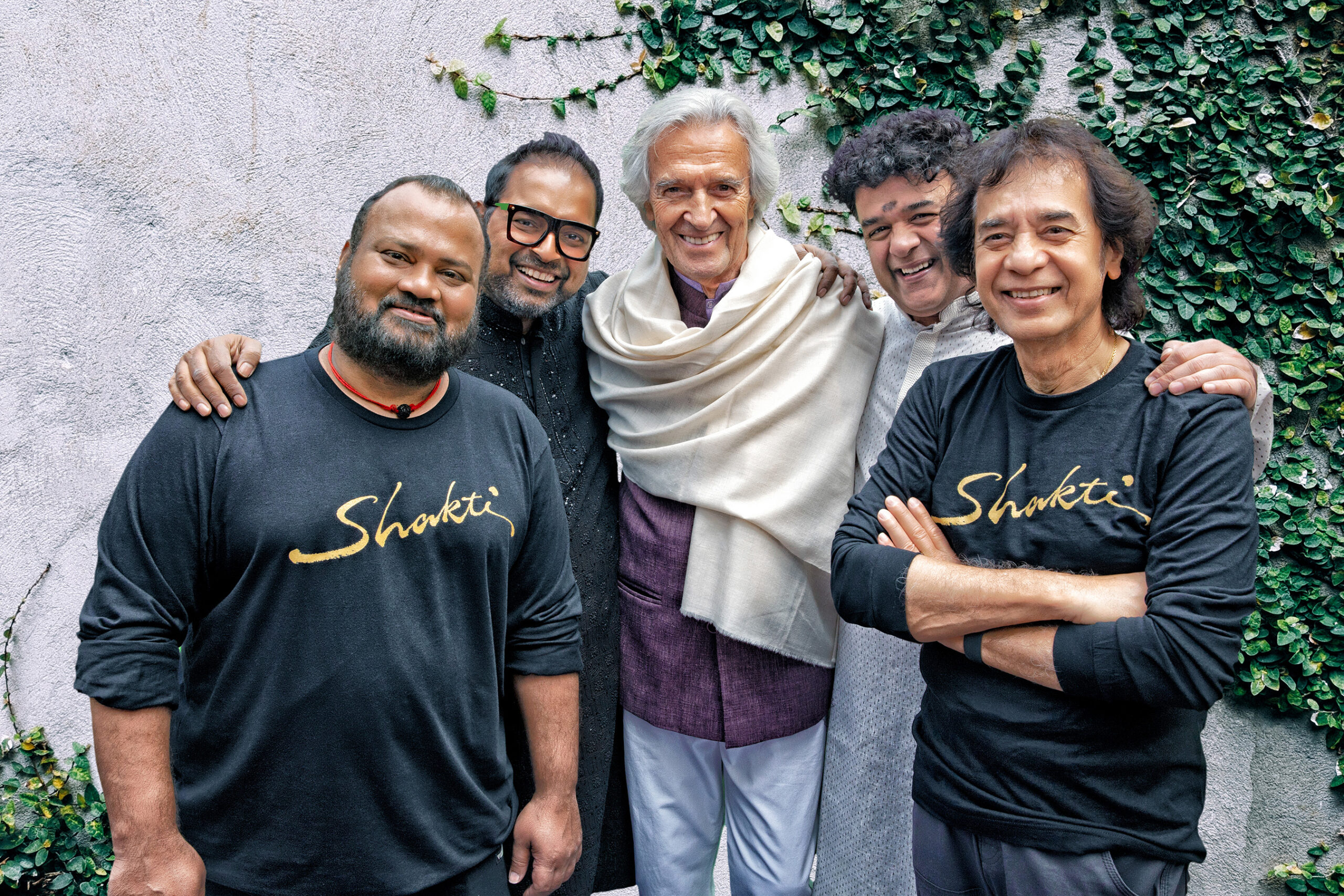A late acknowledgement of the jazz-fusion greats by the Recording Academy notwithstanding, there’s a lot more diversity that has been growing from the style

Jazz-fusion band Shakti.
Earlier today, most of India woke up to the news that Indian music was shining yet again at the Grammys. The Recording Academy Awards, which took place on February 4th, brought cheer to jazz-fusion pioneers Shakti, who won Best Global Music Album for 2023’s This Moment.
In addition to the win with Shakti, tabla maestro Zakir Hussain was part of two more Grammy-winning projects at the 66th Annual Grammy Awards. For his work on Bela Fleck and Edgar Meyer’s album As We Speak (Best Contemporary Instrumental Album) and the song “Pashto” (Best Global Music Performance) featuring flautist Rakesh Chaurasia, Hussain increased his tally. All Indian artists who won Grammys this year have been making Indian fusion music (among other things) for decades, arguably legends, virtuosos and seasoned artistic minds in their own right, which makes the accolade for Shakti a long-deserved one.
It can also tell us a lot about the changing perception of fusion music that draws from Indian classical forms. Across Grammy history, everyone from sitar legend Pandit Ravi Shankar to most recently, the Berklee Indian Ensemble have been up for awards, mostly for fusing India’s traditional music with styles like jazz, Western classical and more. Bengaluru-based slide guitarist, composer and vocalist Dr. Prakash Sontakke says Shakti should have been awarded more than 30 years ago. He says, “What feels good about this award is that it’s been given to the pioneers. Usually, what happens is that people who pioneer [the style] are lost in history.”
Composer, guitarist and producer Ehsaan Noorani turns the pages back a little further, crediting Shakti founder John McLaughlin’s work with his band The Mahavishnu Orchestra as seminal to introducing Indian music elements to a Western audience. “It’s in the sense that McLaughlin didn’t have Indian instruments, but he had Indian principles, scales and raags. I would say Shakti was the true global fusion band,” Noorani adds.
Sontakke says that it’s tough creating fusion music that really breaks through and becomes global the way Shakti has done in the last 50 years. “Unless both cultures [of a fusion project] listen to both sides of the story, the fusion will be unexplored,” he adds. Understandably, Noorani does have a bone to pick with the convenience that a term like “fusion” was coined on, but acknowledges that “global music” – which is the Grammy category name – is much more fitting to describe Shakti. He says, “Zakir is truly a global musician, not just a tabla player, you know? His knowledge of music is very deep, in terms of different styles of music.”
Shakti’s win, according to Sontakke means that Indian classical music can get a bigger push and has proven how versatile it is as a form. He feels there has been complacency in terms of receiving due recognition and quality (which are, of course, interlinked) after the initial acclaim from the Sixties onwards. “I thought it was going to go some next level but then suddenly, it just became a niche. If you wanted to find something you had to go back to records before the Eighties,” Sontakke says.
When asked about current Indian fusion bands that Noorani has tuned into recently, he says nothing for him has stuck the same way the music of McLaughlin has, with some of the newer fusion running the risk of being too “one-dimensional.”
Nevertheless, there are new Indian fusion music experimentalists who are finding audiences in India and are still striving to find a global audience – from Anirudh Varma Collective’s 2023 U.S. tour to vocalist-composer Varijashree Venugopal’s upcoming album produced by Snarky Puppy bandleader Michael League, prog-fusion band Project MishraM becoming regulars on the U.K. tour circuit and more.
Tabla artist Ishaan Ghosh – who releases music as a solo artist as well as with his neo-classical band Araj – says the win for Shakti and Hussain is inspirational. “[Hussain] has been one of the chief architects of the world music scene, particularly placing Indian music – particularly the tabla – on the world map,” Ghosh says. The son of tabla and sitar great Nayan Ghosh, Ishaan says Araj is “strongly inspired” by Shakti. Ghosh released a techno-meets-tabla single called “Euphoria” last month and he says it’s about striking the right balance if Indian fusion music can continue to make a mark globally. “It’s what he [Hussain] has always preached, is to always stay true to your roots.”
A seasoned artist like Sontakke – who has performed with artists around the world – says that it might have taken decades for a leading fusion band like Shakti to get recognized at the Grammys, so the journey for Indian fusion has a lot more to give the country and the world at large. “I have a feeling that in India, the fusion chapter is just the beginning. It can go on for a hundred years without still being fully explored,” he says.
The second edition of the two-day festival brought rare collaborative performances such as Shye Ben…
"Kryptonite" singer previously revealed battle with stage four kidney cancer
From singing bhajans growing up to packing the stage at Lollapalooza India 2026 in Mumbai,…
‘Twinkling Watermelon’ isn't just another time-travel drama, but a deeply human story about recognizing the…
Founding member and guitarist Abdalla Ag Alhousseyni will perform with the band on their three-city…
The upcoming edition of the three-day festival takes place from Mar. 13 to 15, 2026…